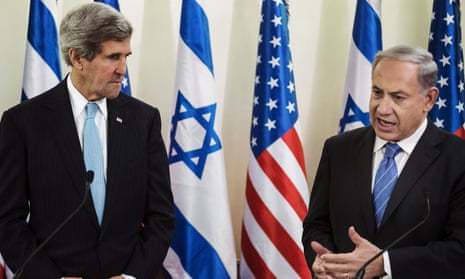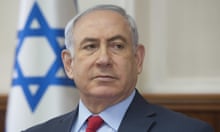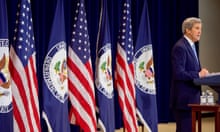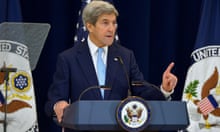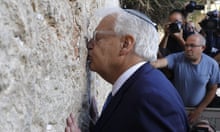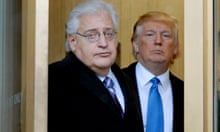John Kerry is due to lay out a US framework for a Palestinian-Israeli agreement as the Obama administration and its international allies scramble to protect what is left of the peace process before Donald Trump takes office.
The US secretary of state will outline the proposals on Wednesday, at a time when US-Israeli relations have reached their lowest point in decades. The government of the Israeli prime minister, Benjamin Netanyahu, has accused Washington of conspiring against it when a UN security council vote on Friday demanded an end to settlement building in the West Bank.
The Kerry speech at the state department at 11am (4pm GMT) is expected to restate the Obama administration’s continued faith in a two-state solution to the chronic impasse. It is a parting shot after eight years in office, during which there has been a dearth of diplomatic progress. It is not expected to lead to any new initiative but rather lay down a marker on a longstanding US and international approach to the region before the US president-elect, whose commitment to such a solution is in doubt, assumes office.
“What secretary Kerry will be doing is he will give a speech in which he lays out a comprehensive vision for how we see the conflict being resolved – where we see things in 2016 as we unfortunately conclude our term in office without there being significant progress toward peace,” the deputy national security adviser, Ben Rhodes, told Israel’s Channel 2 television.
The parameters outlined by Kerry are expected to draw international endorsement at a meeting of foreign ministers on 15 January, just five days before Trump moves into the White House. The meeting is supposed to reinforce a strategy of isolating Netanyahu in the hope it will push him towards reviving stalled negotiations with the Palestinians. Netanyahu has said his government will not attend.
In expectation of a more supportive administration in Washington next month, Netanyahu has reacted to the diplomatic manoeuvring in the last week’s of Obama’s term with defiance.
Israel responded furiously to the UN security council resolution passed on Friday that demanded an end to settlement building, threatening diplomatic reprisals against the countries that voted in favour.
Jerusalem authorities had been expected to discuss the issue of more than 600 building permits for settlements in historically Palestinian east Jerusalem on Wednesday, but the planned vote was cancelled. Hanan Rubin, a member of Jerusalem’s Planning and Housing Committee, told Reuters the request to put off the vote came from Netanyahu.
Netanyahu has vowed to resist a peace framework imposed on his government, and observers warn that a threatened Israeli backlash in the form of thousands of new settler homes in east Jerusalem, combined with Trump’s plan to move the US embassy to the disputed city, could trigger a fresh wave of violence.
The Israeli government is reportedly fearful that any guidelines agreed in Paris would be turned into another UN resolution before Trump’s inauguration, and it has ratcheted up its rhetoric, presenting itself as the victim of an international conspiracy.
A spokesman for Netanyahu claimed to have “ironclad evidence” that the Obama administration had plotted behind the scenes to promote the UN resolution. Israel has said it will present evidence against the Obama administration to the incoming Trump team.
On Tuesday, Egyptian media published a document purporting to be a transcript of a meeting in which Kerry and the US national security adviser, Susan Rice, discussed the UN resolution and US proposals with Palestinian officials, who agreed to give the Kerry framework immediate support. The State Department spokesman, John Kirby, said no such meeting took place.
Meanwhile, Israel’s defence minister, Avigdor Lieberman, portrayed the Paris conference as a new “Dreyfus trial”, referring to an outburst of French antisemitism more than a century ago, and urged French Jews to move to Israel.
On Tuesday a French official denied there was any intention to pass a new security council resolution on the basis of the Paris conference. A foreign ministry spokesperson said the meeting would “give the participants an opportunity to present a comprehensive incentive package to encourage the resumption of negotiations between the Israelis and Palestinians. Only they will be able to conclude a peace deal directly.”
Palestinian leaders hope the UN resolution and the Paris conference will offer some degree of international protection against the encroachment of settlements in the Trump era.
The Palestinian president, Mahmoud Abbas, said he hoped the Paris meeting would establish an international mechanism to end Israeli settlement building.
Trump criticised Friday’s UN resolution, saying it would make it harder to negotiate a peace agreement. In a tweet on Monday, he described the UN as “just a club for people to get together, talk and have a good time”. Trump’s designated ambassador to Israel, his own bankruptcy lawyer David Friedman, has actively supported settlement building.
Aaron David Miller, a former US negotiator on the Middle East and now a scholar at the Wilson Centre thinktank, said Obama’s 11th-hour attempt at legacy building on the Israeli-Palestinian issue could trigger a backlash. “It risks the incoming administration walking away from whatever has transpired in December and early January, and not just walking away from [but] sending unmistakable signals to the Israelis that it would support and favour acts on the ground that go beyond what we’ve seen,” Miller said.
“The odds that Netanyahu will now press and Trump will respond positively to a move to push the embassy from Tel Aviv to Jerusalem, I think have gone up.”
He said that if the highly emotive issue of Jerusalem’s status became the focal point of Israeli-Palestinian friction once more, “then I think the prospects for a serious, significant confrontation are high”.
Amir Oren, a liberal Israeli commentator, argued that the UN resolution could save the government from itself by bringing closer an end to settlement construction.
“Santa Obama delivered a wonderful Christmas present to Israel when the United States opted not to veto Friday’s United Nations security council vote condemning settlement policy,” he wrote in Haaretz. “The passage of the resolution won’t result in the immediate dismantling of any West Bank settlements, but the world is beginning to come to the rescue and try to save Israel from itself.”
